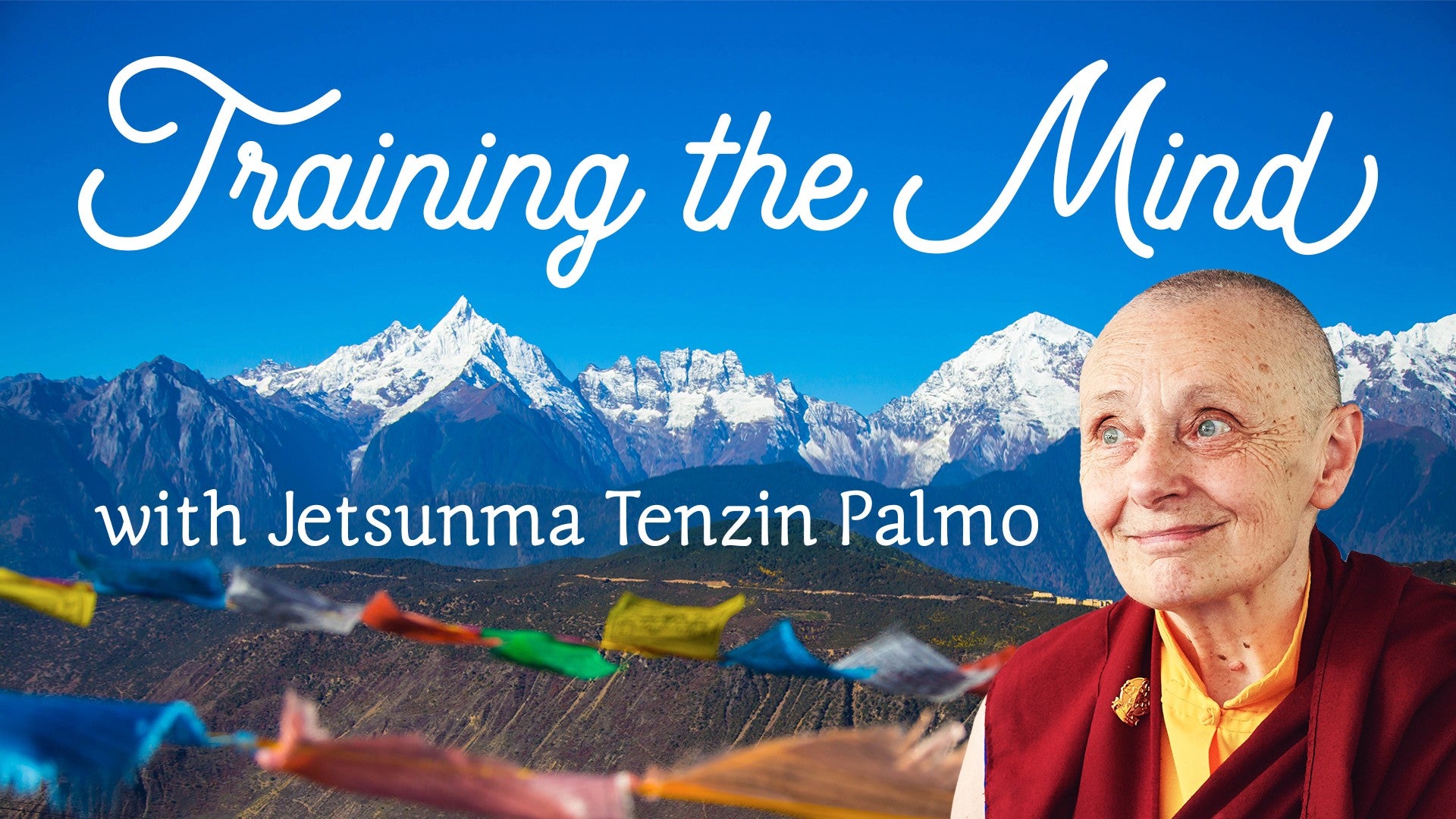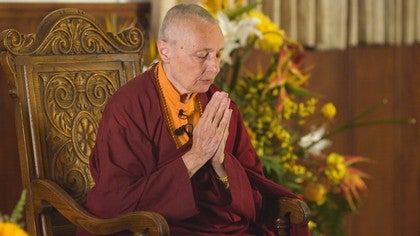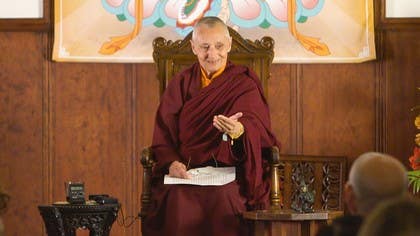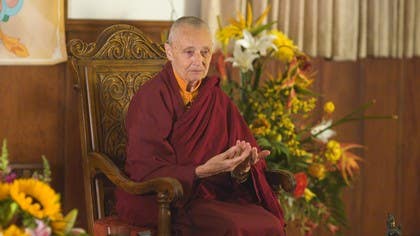Description
About This Video
Transcript
Read Full Transcript
The supreme oral instruction is to observe the mind at all times. In some texts, he says three times in a day, three times in a night, he's more practical, but here he says to observe the mind at all times. That is the ultimate teaching, not only from the Buddha, but from Gopatmasambhava and Melarepa and I mean all the great teachers have all said the essence of the practice is to observe the mind. Okay, so we'll talk a bit about that. Back to taming the mind, right?
So normally in a Buddhist tradition, we start with the breath. We start with observing the breath because the breath is, first of all, we are always breathing. At the same time, we are usually not conscious of breathing. And again, we cannot breathe in the past or in the future. We only breathe now.
So if our attention is really on the breath, not thinking about the breath, but knowing the breath, then at that moment, the mind is present. And the ego cannot live in the present. The ego lives in the past and in the future. If it is brought into the present, it elaborates the present, it decorates it, cannot live in it nakedly without comment. So when we are really focused on the in-breath and the out-breath without talking to ourselves about it, just knowing it, that moment, we are in an echoless state of presence.
So this is a very good preparation. It's very simple. Anyone can do it. Children are especially good. It doesn't have to be for too long because then the mind gets distracted again, but for a time.
And when the mind gets distracted and goes off again, chatter, chatter, chatter, notice and bring it back. Just bring it back, bring it back, bring it back. So gradually, as the attention, our ability to be attentive becomes stronger. And it's all training, it's all practice. As we practice being more attentive, in a very relaxed way, not ten-stop, please, very relaxed, spacious, breathing, knowing, spacious, gradually, in the beginning it seems like we have more thoughts than ever, but gradually the mind begins to settle because the more moments of attention, the less moments of distraction.
So of itself, naturally, as our attention becomes more clear and focused, the background noise begins to quieten down. When in the Tibetan text, the mind is likened to a waterfall like the Victoria Falls or Niagara Falls, just crashing down, then like a very fast flowing river, then gradually the river gets slower and slower and slower until it enters into the ocean. So in the beginning, our mind is wild, but we focus on the breath and ignore the mind. The mind can go blah, blah, blah, blah, blah in the background. That's the television.
It's like if we're in a room with the television on, but we are attentive to a book or to our computer, so we're not turning down the volume, but our attention is not on the television. Our attention is on the task that we are trying to perform. We all know this. We can all do this. The only problem is that the breath is not a fascinating book.
The breath after one or two breaths, oh, not another breath. So to get the mind to settle down onto a subject which is not inherently fascinating requires discipline, but gradually the mind begins to settle, and then there's a deeper sense of inner space arises. It's very pleasant, and that encourages the mind to keep going. So gradually, our ability to be mindful, to be focused, increases, and the distraction grows less, and then the background noise of our mind begins to calm down a bit. Then we are able to turn the spotlight of our attention, of our mindfulness, back onto the mind itself.
We cannot do that until we have developed the ability to separate and observe. If we are still caught up in our mind, we cannot look at the mind at the same time. This is why mindfulness of the breath or the postures or sensations is useful because it not only quietens the mind, but it hones our attention, our ability to observe, which is what we need, the ability to be able to stand back and just look and know without interfering with our comments and thoughts and opinions and ideas. So once we have developed that ability to be more aware, to be more mindful, then we can turn it back onto the mind itself. And as I say, it's like traditionally it's said to be like someone sitting on the banks of the river watching the river flowing by.
We are no longer jumping in the river and being swept along. We are now standing or sitting quietly watching the river. When I was in Lahoul, I lived up in the mountains for many years and below my cave was a meadow. And so in the summer months, sometimes a shepherd would come up with his sheep and he would go to all the different villages and collect their sheep and then bring the sheep up. And so he would get up there.
There was a big boulder. He would lie out on the boulder, get out his bottle of beer and just lie there. And the sheep would all scatter and start feeding. And so he would spend the whole day just watching the sheep and then after a while the sheep had eaten enough, they would just settle down. So by the end of the day, they were just sitting there.
And then the end of the day, he would round them all up, take them back down. So happy shepherd, happy sheep. If a wolf had come, there were wolves. If a wolf had come, he would have been down there like that in the shot. He wasn't asleep.
He was watching, but he wasn't interfering. If one of the sheep had wandered off, looked like he was going to fall down the side of the cliff, he would have been up there bringing him back in. But as long as the sheep were just wandering around feeding and doing their sheep thing, he just watched them, not troubling them at all. The sort of sheep were happy sheep. They settled down and in the end they went back home.
And one day this young Nepali boy came up, obviously the shepherd, the regular old shepherd was doing something else. So this boy had come up and probably he had been told that if he lost a single sheep, he would be murdered. So he was very nervous. And he brought all the sheep up, then he kept them in a big bunch and he was running around the whole time. Every time a sheep tried to leave to get something to eat, push it back in.
And so they were all in a big, tight bunch. They couldn't eat. They couldn't do anything. He was running around and around making sure they all kept in, nice, tight bunch. And at the end of the day, they went back down the hill.
He was completely exhausted. The sheep were unhappy. They were exhausted and also they hadn't had anything to eat. And I thought this is the example between skillfully watching the mind and unskillfully watching the mind. Skillfully watching the mind, you just sit and you watch.
And the mind does its own mind thing and then gradually it settles down. But if we try to keep it too tight and, you know, within constriction, running around to make sure the thoughts don't wander off in any direction they shouldn't and keeping a tight hold on them, the mind becomes very tense and the thoughts in the end will just explode. And so that's very unskillful. So when we are looking at the mind, we should have our attention, but it should be a very relaxed, spacious attention without, during formal practice, discriminating and judging the thoughts. However stupid the thoughts, however brilliant the thoughts, they're just thoughts.
We do not need to believe everything we think. What we think are just thoughts. And if we look at the thoughts, if we really look at the thoughts without grasping or rejection, we recognize that they are like empty bubbles, very shiny sometimes, but empty. So why do we believe everything we think? It's just a thought.
Next year we'll think something else. Which one is true? This is serious because people really do believe what they think, if I think it must be right. And then they, you know, they create endless problems for themselves and for others. They go to war.
They kill others. Why? Because of what they believe. But belief is just a thought. And thoughts are going, and they're empty in their nature.
They're not real, they're not solid, just because I think something doesn't make it true. It's just what I think. We recognize that when we learn to observe the thoughts. Who is thinking after all? So not only in formal practice, but also as much as possible during the day to observe the mind.
He says observe the mind at all times, well, good luck. That means in sleep too. I mean the great masters have this non-dual pure awareness, unborn awareness at all times, even during the time of sleep. But for ordinary people, it's a little ambitious. When I was studying with the yogis in my monastery, they suggested that every hour, three times one would look at the mind.
We have those little apps now that go ding. When it goes ding, just look inside, not judging, just looking. This moment is actually happening in my mind because if our minds are dominated by negative thinking, we are going to be miserable. If our mind is dominated by positive thinking, life will be so much easier, and it all depends on us. But normally people aren't even conscious of what they're thinking.
We just go along with it. Or dredging up all our memories from the past, especially the miserable ones, aren't we perverse? All our dreams and fantasies for the future, all our elaborations and hopes and fears about the present, we're not even aware of what normally is the content of our mind and how much that influences everything which we say and do and all the people around us. Of course it does. The whole crux of our life is in our mind.
We really have to realize that. Just recently we were meeting with one lama who the next day he was going to be entertaining another lama who he had never met before, and this lama, Gachin Rinpoche, was coming with 45 other people, so the lama we were talking to was working out how he was going to cook up enough food for 45 people. The lama who was coming had spent 30 years in a hard labor camp in Tibet, in China, because he was, many of the high lamas and the important people in the monasteries were just imprisoned 25, 30 years or so, tortured, interrogated, and in general much of their life was taken away from them even though they themselves had never done anything in this lifetime to deserve such a thing. So by rights they should have come out, embittered, angry, filled with frustration and revenge and all these other things which most people would feel if they had been unfairly put in a labor camp for 30 years. But these lamas who have gone through this are quite extraordinary because when they come out, the one thing people notice about them is how absolutely filled with light and love and compassion and joy they are, you can't fake it, it just beams from their eyes.
One time the Dalai Lama asked one of these political prisoners, one of the lamas, what did you fear most in prison and he said what I feared most was losing my compassion for my interrogators and tormentors. That's what he feared. He feared something which he himself was in charge of. He didn't fear his interrogator, he feared losing his compassion and so he didn't lose his compassion and many of them said, I met a lama in Tibet who had been 25 years in prison and he said, oh, we're just like a retreat. They even fed us.
One thing which they did do in retreat was because they put so many lamas into retreat together, they taught each other. Someone who was an expert, because they had memorized everything of course, they memorized not only texts but commentaries. When they were all together in prison, they passed their time by passing on transmissions and teachings. So a lot of them therefore that's why they said, oh, it was like a retreat, they were getting all this teaching from each other. But the point was, what I'm trying to say is that our responses, our state of our mind does not depend on external circumstances, it depends on what we do with external circumstances.
This is so important. This is why it's so important to be the master of our own mind so that whatever happens to us we can deal with it in the most skillful way to take everything onto the path. And one of the best ways of learning how to take everything onto the path is to observe the mind. When something happens, how do we respond? Something which is pleasant, do we reach out and want to grasp it?
Something which is unpleasant, do we get upset and annoyed and irritated, angry? How do we respond? We can only know by watching what is going on inside and gradually more and more beginning by our understanding and seeing to be able to naturally respond in a skillful manner. The most precious thing we have is our own mind. We have to have a healthy mind, well balanced.
Truly I can't think of anything more important than for people to learn how to know their own mind and transform their mind from negativity to positive states to then uncover the genuine happiness which is within us, which we can't do as long as our minds are wild monkeys. So the talk then said, the yogi said, observe the mind three times every hour, this we can do. It doesn't mean that in the middle of your busy day suddenly, oh, you can just be, nobody will know you're practicing, right? Just for a few seconds, doesn't take time. Look, in this moment, what is going on in my mind?
Not even judging it, knowing it. Because if we do this gradually, we will be able to extend the period of awareness and especially if something very vital comes up when normally we would respond by being carried away, swept away. At that moment, the mind can again become very clear and see the situation without our ego getting in the middle of it and then in that way be able to skillfully respond in a way which we normally would not have done. So it's very important to know the mind. And in knowing the mind, we can slowly, slowly transform it.
Then we have a nice place to live. You know, I mean, again, I feel, you know, I mean, people put so much attention into their external surroundings, you know, your house or your apartment or your room. We keep it clean. You know, most people at least keep their room fairly clean. I suppose, for example, one was inviting an important guest, then one would make it nice, then clean it, decorate it pleasantly, put nice flowers and make things look nice.
Or with our body. We shower, we wash our hair, we exercise, we eat all the right foods. We try to make our body look nice, we spend a lot of attention on what we're wearing on our appearance that people will find it nice or attractive. We spend so much attention on our bodies and our external surroundings. But where we really live is in our mind.
And how much attention do we give to that? How often do we clean it out? How often do we beautifully decorate it with good thoughts, good feelings? Mostly we just, you know, it's like bringing in all the junk, all the trash. I mean, look at television.
You know, I mean, most of it is, I mean, there are some good things, but a lot of it is trash and the commercials, forget it. You know, and magazines and books and so much of what we take in is useless rubbish. And we don't clean out. So we're living in a garbage heap inside. Outwardly we look very elegant.
Inside garbage. I sometimes think if people had like microphones attached to their head and everybody could hear what we were thinking, loudspeakers, wouldn't we all learn to meditate? And so watching our mind, looking at it and not interfering, we see what a lot of nonsense we're talking to ourselves, criticizing ourselves, replaying difficult times in the past, full of fantasies or dreams or plans or resentments or anger or lust or greed or oh, blah, blah, blah, blah, blah, blah, blah. And we live there and we're not even conscious of what nonsense we're thinking. If people could hear what we were thinking, such stupidity.
So it helps to watch the mind because then the mind, when it's being watched, gets a bit embarrassed. And it begins naturally to bring itself into order. Because if we shine the light on it, then it becomes aware. And then it begins to get itself, naturally begins to get itself more into order and the poisonous thoughts come up much less and the more beneficial thoughts come up much more because now the mind is trying to sort itself out nicely. So even that is a great advantage, that the mind begins to quieten down and we have more access to the positive in us and the negative kind of feels embarrassed and fades away.
So temporary benefit is that. That benefit is that we recognize that the mind is empty, that it is not what we think it is, that we believe our thoughts, that everything is in concrete. It's not like that. It's just flowing, flowing, flowing, flowing and nothing we can hold on to and say, this is it. Because the moment we hold on to a thought, it's gone.
But we have to experience that. And then from that going deeper and deeper into practices which transform the mind and transcend the mind. But first we have to know the mind and we can only know the mind, our ordinary conceptual thinking mind, by observing it. But the most important thing here, I mean, what he's saying is very, very, these four lines are very, very essential, that we are not who we think we are, which is selflessness. The ego is not in control.
We are not the ego, which is who we usually identify with. And that we really need to tame our own mind because any spiritual practice, any way of living in this world happily depends on having a well-tamed mind and being the master of our mind instead of the slaves of our mind. And all our appetites and desires and angers and resentments and envies and all these things which create so many problems for ourselves and for others. What a mess we make. We really have to take this seriously and do something about it.
Don't stop playing around, making excuses, endless excuses. Don't procrastinate. Don't put it off for retirement now, now. And then the aspiration that all our practice and our whole life is to benefit not just ourselves but to benefit others. What can I do to use my life in a way which is of mutual benefit?
Benefiting myself, benefiting others so that at the time of death we can die with no regret. I did something worthwhile. I didn't waste this life. Whatever it is that at least we did something meaningful with this life instead of just wasting it yet again. And then the way to do that is through observing the mind, really in the beginning just making a commitment to every hour that we are awake, looking at it as I say three times, then gradually more times until finally to be in a state of awareness is natural.
We're just naturally aware. All of us can do it. The problem is that we don't. And we make excuses, but no excuses. If we really want to make use of this lifetime, we have to make use.
No one is going to do it for us. Even if the Buddha himself is sitting here, all he could say to you is, practice. He couldn't do it for you. If he could, he would. Of course.
If he could do these great spiritual masters, if they could save us, they would, but they can't. No matter what they tell you, they can't. Only we can save ourselves. So thank you, Atisha. We leave it there for tonight.
And those of you who are coming tomorrow, I think we start at 9. 9 o'clock? 10. Oh, that's nice. Okay.
Okay. So we will start at 10 tomorrow. So let's just, in Buddhist practice, when we do something which is considered to be positive or meritorious, such as that you've took all this trouble to come here to listen to the Dharma talk, then we dedicate the merit for all beings, that all beings should share in this positive karma. So of a Thank you all, and leave the whole mind fully.
Training the Mind with Jetsunma Tenzin Palmo
Comments
You need to be a subscriber to post a comment.
Please Log In or Create an Account to start your free trial.









